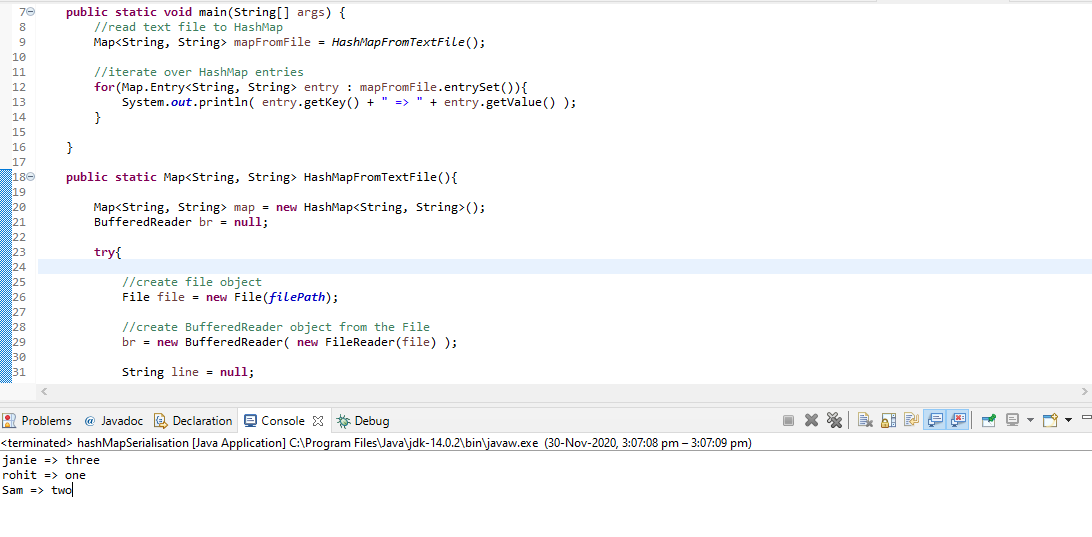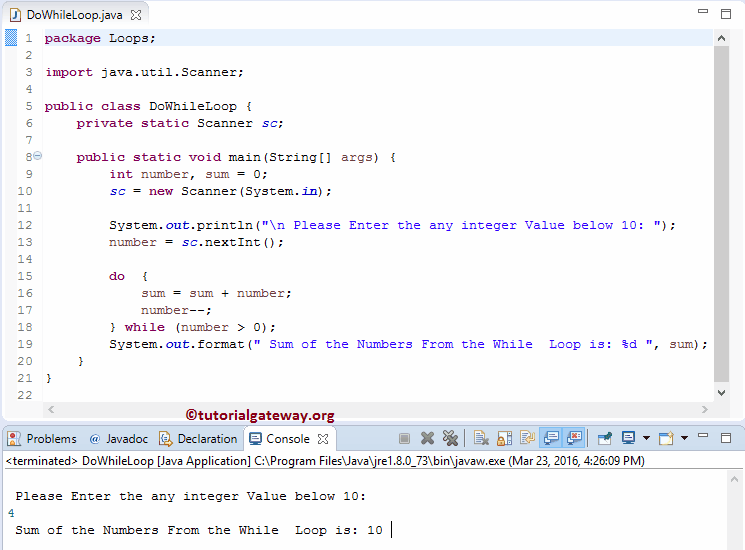

#Iterating through hashmap java how to
OuterBakedGoodsMap4.putAll(actualBakedGoodsMap) ĪssertEquals(actualBakedGoodsMap, outerBakedGoodsMap4) ĪssertEquals(actualEmployeeMap, employeeMap1) 6. Below example shows how to read add elements from HashMap. For a user-defined map, if all identical objects are moved into another map, the equality check succeeds: Map> outerBakedGoodsMap4 = new HashMap() If both the maps are the same, then the equality check succeeds. Map> expectedMap = setupAddressObjectMap() ĪssertNotSame(expectedMap, actualEmployeeMap) ĪssertNotEquals(expectedMap, actualEmployeeMap) Otherwise, the checks will fail: //Comparing a Map> and Map> mapĪssertNotSame(employeeMap1, actualEmployeeMap) ĪssertNotEquals(employeeMap1, actualEmployeeMap) Map> employeeAddressMap1 = mUtil.createNestedMapfromStream(listEmployee) ĪssertNotEquals(employeeAddressMap1, actualEmployeeAddressMap) įor the Map with user-defined objects as values, we need to customize the equality method using one of the methods mentioned in the comparing HashMaps article. 8 Best ways to Iterate through HashMap in Java Method 1. In this article, we will learn about all the different ways of iterating a HashMap in Java. OuterBakedGoodsMap3.put("Donut", mUtil.buildInnerMap(batterList)) ĪssertNotEquals(outerBakedGoodsMap2, actualBakedGoodsMap) Unlike other Collections, we cannot iterate through HashMap directly we need to get the keySet or entrySet to iterate. Similarly, if we change the outer Map‘s contents, the equality check will fail as well: assertNotEquals(outerBakedGoodsMap2, actualBakedGoodsMap)
put ( 5, 'Hibernate ORM framework' ) Iterator < Entry < Integer, String >.put ( 4, 'Spring Framework' ) coursesMap.
 If the inner objects are all new instances every time in the case of user-defined objects, the equality check will also fail. Iterate through a HashMap EntrySet using Iterator Map < Integer, String > coursesMap new HashMap < Integer, String > () coursesMap.
If the inner objects are all new instances every time in the case of user-defined objects, the equality check will also fail. Iterate through a HashMap EntrySet using Iterator Map < Integer, String > coursesMap new HashMap < Integer, String > () coursesMap. If we change the inner Map's contents, the equality check fails. The default implementation compares each value. We can compare them using the equals() method. There are many ways to compare HashMaps in Java. In the second example, we are building an object of type >: Map> employeeMap = new HashMap() ĮmployeeMap = listEmployee.stream().collect(oupingBy((Employee emp) -> emp.getEmployeeId(),Ĭollectors.toMap((Employee emp) -> emp.getAddress().getAddressId(), fEmpObj -> fEmpObj.getAddress()))) collect(oupingBy(e -> e.getAddress().getAddressId(),Ĭollectors.toMap(f -> f.getAddress().getAddressLocation(), Employee::getEmployeeName))) We can also iterate keys and values separately without any error.

We're then building a nested HashMap: Map> employeeAddressMap = listEmployee.stream() A map can be iterated by for, forEach and while loop from the Entry interface. The loop iterates over each key-value pair, where each pair is represented as a Map.Entry object. In the first example, the Employee has the Address object nested inside it. Using for-each loop with entrySet (): Java provides a for-each loop that can be used to iterate over the entries in a hashmap. Here, we have two examples: one has an inner Map of Strings, and the other is a Map with Integer and Object values.
#Iterating through hashmap java code
Possible Duplicate: How do I iterate over each Entry in a Map How can I iterate over a map ofpackage we have a List that we want to convert to a Map, we can create a stream and then convert it to a Map using the Collectors.toMap method. 1 This question already has answers here : Closed 10 years ago. Now I have the below POJO class and for each key/value pair from the above Map you may need to form objects using the below POJO class and need to add each object to the List. Suppose you have some values in a HashMap as shown below: Map propertiesMap = new HashMap() So I will show you here how to iterate a Map and form an object and finally add it to the List using Java 8 lambda expression. I came across a situation where I required to fetch data from a HashMap and add it to an ArrayList. Here I will show you how to iterate Map in Java 8 and add element to List.


 0 kommentar(er)
0 kommentar(er)
